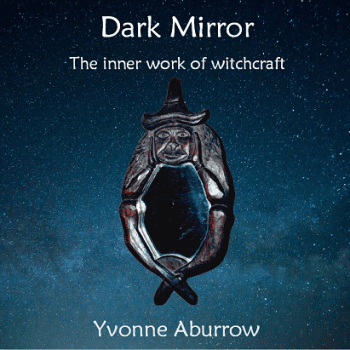Hello, beautiful creatures. Previously on Outside the Charmed Circle, I identified the first power of the Magus as discernment, “the ability to comprehend obscurity and distinguish between complex ideas, [and] to judge situations without reducing their complexity to fit a simplistic model of reality.” I ended on a promise to identify a few tools I’ve used in honing my own powers of discernment.
Today, I intend to make good on that promise. In doing so, I realize that I’m undertaking something of a challenge—a few challenges, really—so I’m going to issue my disclaimers upfront.
First, I’m hardly a model of spiritual enlightenment or perfect discernment. While I’ve managed to learn a thing or two in the past mumble years, I’m light years (and several tons of salt) away from being a saint, bodhisattva, arhant, walī, tzaddik, Secret Chief, Lodge Master, Witch Queen, or Big Man in Black. I’m not even a Big Name Pagan™. I’m just another fool on the path, and my suggestions are just that: suggestions.

Second, there’s the question of applicability. Simply put, not every tool or method works for every person. What I’m suggesting has worked for me… when I’ve put it to use, that is. (What can I say? I’m a lazy mystic in my best moments.) I make no guarantees that anything I say will, or even can, help you develop your powers of discernment. I can only offer what’s worked for me so far, with the hope that you might find some of it useful.
Third, I make no claims that any of what I’m suggesting is easy. On the contrary, it’s some of the hardest work I’ve done, spiritually or psychologically. These are pretty basic suggestions, but I’ve found through bitter experience that it’s really easy to gloss over the basic lessons early on, only to have to relearn them once you get a certain distance down the path. If you read what follows with a certain degree of chagrin, I promise you I’ve shared every bit of that chagrin… and sometimes quite recently. (If, on the other hand, you read what follows and think “Well, duh,” I congratulate you on your spiritual advancement. No, really, I do.)
And finally, the formal disclaimer: I am not a therapist, counselor, or life-coach. What credentials I have don’t extend to giving people any kind of medical or therapeutic advice. The following suggestions are offered solely in the spirit of “these are things I’ve done that work for me, and might work for you.” If you are in a discernment process related to physical or mental health issues, I encourage you in the strongest possible terms to seek professional advice.
So, with those disclaimers in mind, here are three things I’ve done, and continue to do, to sharpen my discernment.

1. Press pause.
Generally speaking, we most need to engage our discernment when confronted with complex, high-stakes situations, such as “Should I go to grad school?” or “Should I be initiated into that mystery school?” After all, simple situations with high stakes (“My hair is on fire!”) don’t really give us much time to think, and complex situations with low-stakes (“Where should the twelve of us go for lunch?”) don’t really tax our composure. The trouble is, complex high-risk situations are stressful, which can lead to an artificial sense of urgency. Neither stress nor urgency are particularly conducive to the contemplation and deliberation inherent to discernment. In fact, they can drive us to rush through any discernment process so we can “get an answer” quickly, alleviating the unpleasantness of the tension and time pressure.
Sadly, the solution is to stop rushing. In fact, stop doing. Just for a bit, anyway. Be still. Breathe. I hesitate to say “meditate,” because I know that word has a lot of baggage for many folks, but that’s the general idea. Discernment isn’t a thing you can force… quite the opposite, I’m afraid. You’ve got your great big engine of a brain all revved up, and it’s not going to do anything but rush and lurch around while you’ve got the pedal floored. So, give it a rest.
Of course, that’s easier said than done, right? If you already have a meditative practice that works for you, this is an excellent time to put it to use. If you don’t, you can try taking one up now, or you can find something that fulfills a similar role in your mental and spiritual landscape. For some of you, that might be dancing, or singing, or playing an instrument. For others, it might be knitting, or cooking, or whittling. It could be a long walk, a bicycle ride, a long drive. Hell, maybe it’s playing cards, or video games, or both. (I once found God while playing Freecell, but that’s a story for another time.) The point is to engage your mind with something other than the situation you’re trying to resolve. You have to give that big ol’ brain of yours some time to cycle down and cool off before you can do any useful thinking… which is, after all, the whole point of discernment.
2. Ask questions.
So, here’s the thing: most of us are terrible liars, except when we’re lying to ourselves. Then, of course, we’re spectacular liars, and never more so than when we’re faced with an issue that’s deeply significant to us. This is all kind of a problem when you’re trying to discern the truth of a situation and take the best course of action. The obvious solution is to be honest with yourself, but as anyone who’s grappled with inner (or outer!) demons can attest, that’s a lot harder than simply resolving to tell the truth. One of the reasons we lie to ourselves is for protection, and trying to turn off your psychological self-defense behaviors by will is a bit like trying to force yourself not to flinch when something’s flying in your face.
What I’ve found works well for me as a way to work around those defenses is to sit down, preferably with paper and pen or a keyboard, and ask myself some directed questions. The specific questions may vary from situation to situation, but they’re generally along these lines:
- What outcome am I hoping for, and why am I hoping for it?
- Why this outcome, and not that one?
- How will it affect me if this happens? How will it affect me if it doesn’t?
- Am I scared, anxious, excited, angry?
- Where are those emotions coming from, and how are they affecting me?
- Am I making choices out of fear?
- What am I afraid of?
- What do I think my choices say about me?
And so on. You can use this method recursively, peeling back layers of desire and emotion and assumption to see what’s beneath them: “Why do I want this? Because it gets me that. Why do I want that? Because it makes me feel this way. Why is it important for me to feel that way?”
Why do I suggest doing this on paper? In her 1976 essay “Why I Write,” Joan Didion sums up my reasons in a single sentence: “I write entirely to find out what I’m thinking, what I’m looking at, what I see and what it means.” My brain is fantastic at hiding my own truths from me, and I find it much easier for me to get my thoughts in order—or even to know what I actually think—when I’ve converted them to written words.
This kind of investigation may not “solve the problem” for you, but it’ll give you a lot more information about your own thought processes. You may find surprising connections or hidden motives, new pieces of the puzzle or old assumptions you’ve never really examined before. Sometimes, that can be enough to break the logjam and clear a path to a decision or conclusion.
3. Reach out.
And other times, it’s not. Other times, even after I’ve put my brain’s spinning gears in neutral and taken a written inventory of my own thought processes around the situation, I find I’m still unclear about how to proceed. At that point, I often find it’s helpful to tag someone in and ask for help.
Being something of an ambivert, I get sick of my own company on a regular basis. (I get sick of other people’s company, too. That’s the “ambi-” part.) As polytheists, Pagans, and practitioners of esoteric spiritual and religious paths, most of us have a plethora of strange and wonderful friends with whom we communicate on a regular-ish basis. Some of these friends are corporeal, while others are… less so. When I get stuck trying to discern my path forward, I’ll reach out to someone whose judgment I can trust: my partner, a friend, a fellow practitioner, or even a professional colleague, depending on the situation. I’ll outline the situation for them as I understand it, with reference to my notes if need be, and ask for their perspectives. We’ll talk, and then—and this is the tricky part—I listen to what they have to say as information, without arguing against it or flatly accepting it. Again, this won’t necessarily “solve” anything, though on occasion it’s been key to resolving a problem I couldn’t see clearly on my own. Rather, it’s another lens through which to see the situation.
If I’m discerning something especially momentous or life-changing, I’ll reach out to one of my non-corporeal allies, a god or spirit with whom I have an amicable relationship, and seek their advice and guidance. Different folks have different methods for doing this: prayer, meditation, invocation, divination. Personally, I tend to default to a form of prayer which involves grounding and centering myself, reaching out to the ally by whatever means we’ve agreed upon, and literally having a chat with them. I lay out the situation for them, much as I would for my corporeal friends, and then I listen. If I can, I ask clarifying questions, and then I thank them in whatever manner we’ve established. Afterwards, I spend some time meditating (or ruminating) on what they said and how it applies to my situation. If they gave advice, I follow it, unless I have a damned good reason not to do so. (On the vanishingly rare occasions that they’ve issued directives, I’ve always complied, but I’ve never been told to do something I was ethically opposed to doing. In the event that happens, I refer the reader to my previous post on saying “no” to gods.)
And that’s what I’ve got.
I’m aware that I’ve essentially advised you to calm down, think clearly, and ask for help, all of which seems headsmackingly simple. However, as I said earlier, the simplest lessons are sometimes the easiest to forget, and I’m as guilty as anyone else. With the exception of a few gifted folks (who, I’m sure, have much better things to do than read this blog), magic and spirituality are hard work. Not always, and not in the same places for the same people, but there’s a reason we call the act of doing magic a “working.” That work is every bit as internal as it is external—as above, so below, and like that—and it’s usually far less glamorous than the fancy robes and sonorous liturgical declamations might lead us to believe. Often as not, the work involves a lot of study, contemplation, and digging through my own past to work out my issues, all while attending to the daily business of life.
The discernment process can be knotty, thorny, subtle, impenetrable, even overwhelming. If you’re in such a process, for whatever reason, I hope these simple tools will be of some use in honing your judgment.
Until next time, dear ones, look sharp. ♥
















